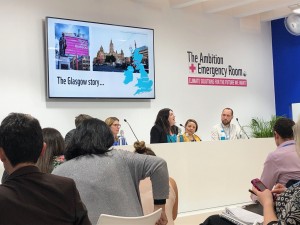At this year’s COP, my focus is on subnational actors and their role in both official negotiations and in promoting climate action more broadly. As more than half of the world’s population lives in urban areas and cities emit 75 percent of global CO2 emissions, municipalities play perhaps the most important role in combatting the climate crisis on the ground.
Luckily, unlike many countries, cities are increasingly committed to climate action. For instance, almost 100 megacities across the globe have joined the C40 Climate Cities Leadership Group, which commits all of those cities to a Global Green New Deal and to developing climate action plans by 2020. Thirty C40 cities have peaked emissions and 25 have pledged to be emissions neutral by 2050. Similarly, almost 2000 small municipalities are members of Local Governments for Sustainability (ICLEI), which is a big proponent of data sharing, greenhouse gas inventories, and future emissions predictions. Together, these networks of municipalities are fighting for a greater role in the Paris Agreement, perhaps through LDCs (locally determined contributions) as a supplemental mechanism to NDCs. They are also working to improve urban climate finance mechanisms, especially in developing countries, as well as to pressure their national governments to up their NDCs.
Today, I attended an interesting talk on how many cities across the globe are aligning their policies and plans with a 1.5C pathway. One of the speakers at the event was Susan Aitken, who serves as the leader (mayor) of Glasgow, a city that will host next year’s COP. Susan, as she preferred to be called, outlined Glasgow’s plans to become the UK’s first net-zero carbon city (by 2030). She discussed a public-private partnership with Scottish Power to boost investment in renewable energy production and storage, as well as to promote the use of electric vehicles.
Refreshingly, she also spoke in depth about a moral responsibility for climate justice and a just transition, especially given that Glasgow’s bad air quality is concentrated in poorer areas of the city. She emphasized the need to expand the city’s public transportation networks to poorer neighborhoods, as well as to promote access to green space and recreation in those areas. Importantly, she stressed the importance of including citizen voices in any sustainable planning processes.

It was really interesting to learn about Glasgow’s innovative leadership role in combatting climate change — both through the private sector and through participatory planning. It also made me excited about next year’s COP (even if I won’t actually be there). Hopefully at COP 26, Glasgow emphasizes the importance of including subnational actors more directly in the COP process. I also hope that being in Glasgow will provide other subnational leaders with a model on how to decarbonize former industrial cities. Glasgow was where James Watt conceived of the modern steam engine. Now it is becoming a pioneer in new, participatory, just environmental technologies and policies. The city has come a long way from its industrial roots.
Quick video summary of Glasgow’s net-zero efforts here: https://www.youtube.com/watch?v=ANLdqvzi44s.
I am also interested in subnational engagement and specifically how urban areas can (and must) be part of the path forward. I am interested in reading your final paper and seeing how you pull your experience together. I plan on talking some about urban issues in the ENVS001 this year, so maybe there will be some lessons to share here.